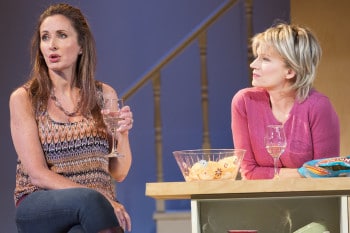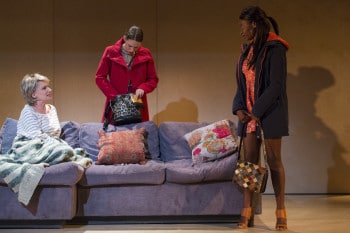Review: Jumpy, Sydney season
Jane Turner is the heart and soul of Jumpy, a Melbourne Theatre Co production presented by Sydney Theatre Co that has just landed at the Drama Theatre. She is Hilary, fifty years old and floundering as a parent, a professional, and a partner, and Turner is hapless and sweetly bewildered in a performance that, under Pamela Rabe’s direction, never becomes too broad.
Her comic roots are best felt in an understated, running set-design gag: scenery appears and disappears as though on a conveyer belt and Hilary is always a step or two behind, bumping into a retreating bed and stumbling to get over to the kitchen set. It’s a bit of an obvious metaphor, but it helps keep the play in light-hearted territory, and Turner plays it perfectly and Michael Hankin’s design is given a more playful life by the bit.

Hilary’s daughter Tilly (Brenna Harding) is fifteen and stalking down adulthood to make it her own, with boyfriends (notably Laurence Boxhall’s Josh) and parties and everything that entails, and Hilary is concerned; she wants to make sure Tilly is making choices because she wants them, not because men or the world around her do. Hilary flirted with the radical aspects of feminism in its second wave; she keeps her principles now as much as she can, but still isn’t sure how to translate them to the present day. Of course, the last thing Tilly wants to do is discuss her choices with her mother.
Playwright April De Angelis has drawn the teenagers a little too broadly for any kind of nuance, which makes it hard for the audience to feel sincere empathy for them, but the caricatures and rough sketches are recognisable enough that they elicited plenty of laughs on opening night, no matter how predictable the beats.
Harding does good work as Tilly, playing her frustration well against Turner’s largely ineffectual mothering, but the standout teen character on stage is Lyndsey (Tariro Mavondo), Tilly’s friend who has just given birth to a baby. When Tilly runs into a pregnancy-shaped bump in her road, Hilary calls a meeting with Josh and his parents Bea (Caroline Brazier) and Roland (John Lloyd Fillingham) along with Tilly and Hilary’s husband Mark (David Tredinnick), and invites Lyndsey to join them. As the adults argue the pros and cons (well cons), of having a child as a teenager, Lyndsey sits with her baby. Tilly won’t have any options, Bea declares. “I have options,” Lyndsey pipes up to argue, and we laugh when this is countered with “Limited options”, but the dissonance and the rift between it there is soft and stirring – thanks to Mavondo’s performance.

Aside from this small moment, and a few others along the way that are best unspoiled, there’s not much heft to Jumpy. It attempts to position itself as a comedy with deep ideas lurking beneath, about feminism and womanhood and family, but Jumpy on the whole plays it safe, something of a more pleasant Ayckbourn, or a more rewarding Williamson, or a less caustic Baitz.
Pamela Rabe has shot the play through with a sense of buoyancy; for every funny moment she paint it as something realistic, playing small to stay true to reality. The most outrageous performance comes from Marina Prior’s Frances, but she’s playing an outrageous woman, so it all tends to make a kind of internal sense. When she takes over the play for a moment late in the first act, the laughs come loud and long, but Prior is in complete control, and it’s a winning thing.
But mostly it’s a good vehicle for Turner, who carries the more dramatic moments quietly, simply, and well. Her strain with her husband is polite, her flirtation with Roland timid and pleasingly girlish, at times, and a welcome compassion in a particular scene with a 20 year old (Dylan Watson), but there’s a welcome taste of fire whenever she squares off against a delightfully brusque Brazier that helps balance Hilary out.
After a fine, slightly dull first act, the play raises its stakes and it becomes a more rewarding viewing experience, but never really becomes something essential. Most plays aren’t. At least this one is lightly funny and easy to watch.




